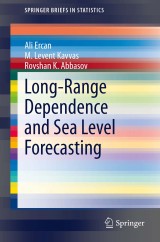Details

Long-Range Dependence and Sea Level Forecasting
SpringerBriefs in Statistics
|
53,49 € |
|
| Verlag: | Springer |
| Format: | |
| Veröffentl.: | 30.08.2013 |
| ISBN/EAN: | 9783319015057 |
| Sprache: | englisch |
Dieses eBook enthält ein Wasserzeichen.
Beschreibungen
<p>This study shows that the Caspian Sea level time series possess long range dependence even after removing linear trends, based on analyses of the Hurst statistic, the sample autocorrelation functions, and the periodogram of the series. Forecasting performance of ARMA, ARIMA, ARFIMA and Trend Line-ARFIMA (TL-ARFIMA) combination models are investigated. The forecast confidence bands and the forecast updating methodology, provided for ARIMA models in the literature, are modified for the ARFIMA models. Sample autocorrelation functions are utilized to estimate the differencing lengths of the ARFIMA models. The confidence bands of the forecasts are estimated using the probability densities of the residuals without assuming a known distribution.</p><p>There are no long-term sea level records for the region of Peninsular Malaysia and Malaysia’s Sabah-Sarawak northern region of Borneo Island. In such cases the Global Climate Model (GCM) projections for the 21st century can be downscaled to the Malaysia region by means of regression techniques, utilizing the short records of satellite altimeters in this region against the GCM projections during a mutual observation period.</p><p>This book will be useful for engineers and researchers working in the areas of applied statistics, climate change, sea level change, time series analysis, applied earth sciences, and nonlinear dynamics.</p>
1. Introduction.- 2. Long-Range Dependence and ARFIMA Models.- 3. Forecasting, Confidence Band Estimation and Updating.- 4.Case Study I: Caspian Sea Level.- 5.Case Study II: Sea Level Change at Peninsular Malaysia and Sabah-Sarawak.- 6. Summary and Conclusions.- 7. References
<p>Dr. Ali Ercan is a postdoctoral researcher at the University of California, Davis, Department of Civil and Environmental Engineering and co-manager of UC Davis J. Amorocho Hydraulics Laboratory since 2009. Dr. Ercan specializes in the areas of experimental and environmental hydraulics, sediment transport and water quality modelling, computational fluid dynamics, stochastic processes, and time series analysis. </p><p>Dr. Rovshan K. Abbasov is an Associate Professor at Khazar University and a laboratory head of the Hydrometeorology Institute of the Ministry of Environment and Natural Resources, Azerbaijan. He has long experience in research and consulting. His research interests are mainly focused on Integrated Water Resources Management, Watershed Hydrology, Flood Management, Disaster Risk Reduction and Eco-hydrology. Prof. M. Levent Kavvas is an endowed chair professor at the University of California, Davis, Department of Civil and Environmental Engineering, working in the areas of hydrology, hydraulics and hydro-climatology. </p><p>Prof. Kavvas has been the director of UC Davis J. Amorocho Hydraulics Laboratory since 1993. Prof. Kavvas is currently a member of the UNESCO Expert Group on Climate Change, member of Asia-Pacific Water Forum Steering Group on Climate Change and Water, consultant to Asian Development Bank on climate-change-related modeling studies, chair of American Society of Civil Engineers Hydro-climate committee, and member of the Climate Change Technical Advisory Group for California Department of Water Resources.</p>
<p>This study shows that the Caspian Sea level time series possess long range dependence even after removing linear trends, based on analyses of the Hurst statistic, the sample autocorrelation functions, and the periodogram of the series. Forecasting performance of ARMA, ARIMA, ARFIMA and Trend Line-ARFIMA (TL-ARFIMA) combination models are investigated. The forecast confidence bands and the forecast updating methodology, provided for ARIMA models in the literature, are modified for the ARFIMA models. Sample autocorrelation functions are utilized to estimate the differencing lengths of the ARFIMA models. The confidence bands of the forecasts are estimated using the probability densities of the residuals without assuming a known distribution.</p><p>There are no long-term sea level records for the region of Peninsular Malaysia and Malaysia’s Sabah-Sarawak northern region of Borneo Island. In such cases the Global Climate Model (GCM) projections for the 21st century can be downscaled to the Malaysia region by means of regression techniques, utilizing the short records of satellite altimeters in this region against the GCM projections during a mutual observation period.</p><p>This book will be useful for engineers and researchers working in the areas of applied statistics, climate change, sea level change, time series analysis, applied earth sciences, and nonlinear dynamics.</p>
A unique statistical approach to estimate sea level forecasts Case studies included Written by experts in the field

















